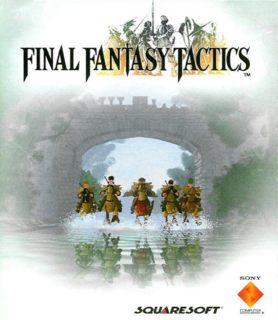A deep and challenging strategy RPG that will entertain and frustrate in equal measure.
The game itself, however, doesn't *quite* hold up so well. But thats not to say for a second that the game its bad. Let me explain a little. First of all, you have your individual warriors. Each character in your party has a job class, which you can change as often as you like, and when they perform actions in battle they earn job points relevant to that class which can be spent on buying new abilities and advancing in job levels. When a character reaches a certain level in a job, they can become another class which offers different abilities, and so on, giving you more options in battle- but when you change job, you will only be able to use one set of skills from a previous job, so you'll need to pick your combination of skills for each character very carefully to suit your tactics in the coming battle. Battles themselves allow you to take a limited selection of your characters into them- usually no more than 4 or 5, often less- and you then commence a traditional turn-based battle sequence as you might have seen in more recent games like Disgaea. Characters act in turn depending on their speed, and they can act and move once in a turn. You'll have to think carefully about what you want them to do, as well, because theres a lot of moves at your disposal, and the enemies are pretty unforgiving if you make the wrong choice.
Which brings us down to the main drawback (or possible appeal...) of the game: the opponent AI. The enemies are downright sods to you. Ruthlessly unforgiving, they'll take great delight in stopping you from achieving your objective, picking on one of your characters, and generally using every dirty trick in the book against you. On the flipside, allied NPC's aren't anywhere near as bright- in fact, they seem to go out of their way to *not* work in conjuction with your forces, going off on their own, targeting one enemy with a radius-attack when they could have got two, and just generally being unhelpful. Whats worse is that often these CPU controlled characters don't get to do much in the fight, and consequently don't get much experience- meaning they're that much weaker in the next fight. Worse still, you can't take them into random battles that you can fight against enemies to level up your own characters, so they get progressively weaker as the game goes on- making story missions very hard indeed, since your characters will have to do most of the hard work. Perhaps thats how it should be, but it seems a little strange that the NPC's with you who are meant to be powerful warriors can't hold their own in a fight. The random encounters are much easier- often too easy, comparatively speaking, but they at least allow you to level your characters without too much trouble.
Frustratingly, the game has some silly problems that really get in the way as well. For instance, once you chosen to move or perform an action, thats it. Theres no confirmation to check if you're sure, and no way to go back- so if you move a character only to realise that you're one square out of range of the enemy, its tough. Theres no way to go back. The camera is also a problem in the game- often your view is obscured by raised terrain or scenery, and although you can pivot the camera and raise it or lower it, its often a struggle to get the right view for the fight. This is made particularly annoying when the game auto-moves the camera when moving an NPC or monster. There are other niggling issues as well; theres no way to skip dialogue sequences before or after battles, which is a pain when you're often having to restart a battle that you just lost, and some of the spell effects look pretty poor- the summon effects are markedly lazy, consisting of a static image of the summoned creature with some sparkling particules around them. Granted, the artwork is nice, but its hardly as impressive as it should be.
These problems are unfortunate, because they can detract from the experience of the game, and they are problems which Final Fantasy Tactics Advance managed to avoid without batting an eyelid. That said though, FFT: War of the Lions is a better game than FFTA, if only for the excellent storyline and stronger, more varied game mechanics. It looks great, thanks to the facelift, and theres more depth to it than an ocean. Its probably the strongest game of its type on the PSP, but that doesn't stop it being hugely frustrating and, sadly, somewhat dissapointing at times. FFT:WotL is a good game, just not quite a great one.

